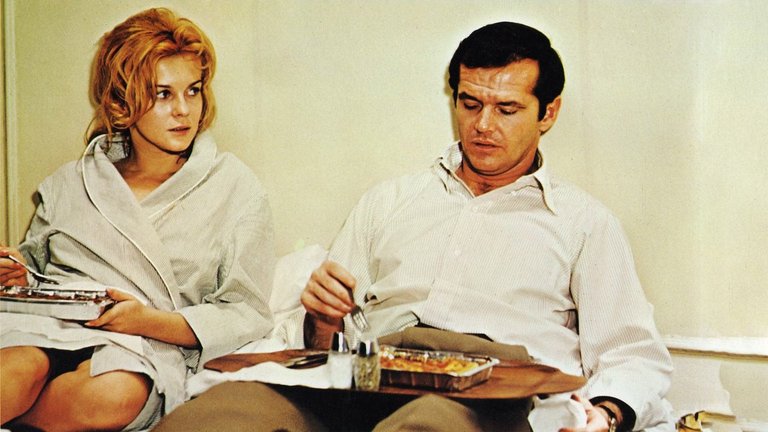Film Review: Carnal Knowledge (1971)

There exists a peculiar category of films—technically proficient, lauded by critics in their day, and enshrined in cinematic lore as “masterpieces”—that, upon retrospective viewing, provoke not awe but bafflement. These works, while undeniably polished and ambitious, often leave contemporary audiences cold, their once-potent themes diluted by cultural shifts or overtaken by more daring successors. Mike Nichols’ Carnal Knowledge (1971), a caustic exploration of male sexuality and friendship, epitomises this phenomenon. Praised at its release for its audacity and insight, the film now feels curiously sterile, its characters more like clinical case studies than flesh-and-blood individuals. What was once hailed as a searing indictment of postwar masculinity now registers as a dated, often tone-deaf artefact—a relic of its era that struggles to resonate beyond the confines of its own self-satisfied cynicism.
The film traces the decades-long friendship between Jonathan Fuerst (Jack Nicholson) and Sandy (Art Garfunkel), beginning in the late 1940s at Amherst College. Sandy, diffident and romantically inexperienced, forms a tentative bond with Susan (Candice Bergen), a Smith College student whose affections are quietly usurped by the brash Jonathan. This betrayal establishes the dynamic that defines their relationship: Jonathan’s alpha-male posturing contrasts sharply with Sandy’s beta-male passivity. Susan’s choice to marry Sandy—despite losing her virginity to Jonathan—hints at a critique of male entitlement, though the script never fully interrogates her agency.
Years later, the pair reunite in New York City. Sandy, now a paediatrician and family man, listens as Jonathan bemoans his inability to find the “perfect woman,” a complaint that rings hollow given his string of conquests. Jonathan’s subsequent relationship with Bobbie (Ann-Margret), a glamorous but domestically inept model, unravels as his misogyny intensifies. When Sandy, recently divorced, introduces his new girlfriend Cindy (Cynthia O’Neal), Jonathan’s proposal of partner-swapping culminates in Bobbie’s suicide attempt—a moment played with shocking detachment. By the 1970s, both men are emotionally adrift: Sandy pursues a younger lover (Carol Kane) in a cringe-inducing bid for relevance, while Jonathan, now impotent, seeks solace in the arms of a jaded prostitute (Rita Moreno). The narrative’s episodic structure, though ambitious, undermines emotional investment, reducing its characters to pawns in a schematic moral fable.
Written by cartoonist Jules Feiffer and initially conceived as a stage play, Carnal Knowledge emerged during Hollywood’s post-Hays Code libertinism, capitalising on newfound freedoms to depict sex and profanity. The film’s shock tactics—a condom shown onscreen, Nicholson’s deployment of a then-taboo slur—were undoubtedly transgressive in 1971. Yet, half a century later, these moments feel less revolutionary than quaint, their impact dulled by decades of increasingly explicit media. Feiffer’s script purports to dissect the Sexual Revolution’s paradoxes, framing carnal freedom as both liberating and corrosive. However, its insights are undermined by a prurient gaze that often conflates critique with voyeurism. The much-discussed nudity—including Nicholson and Margret’s mid-film scenes—serves less as commentary than titillation, a contradiction the screenplay never resolves.
The film’s central irony lies in its protagonists’ role reversal. Jonathan, the archetypal alpha male, begins as a swaggering lothario, seducing women with a mix of charm and manipulation. Nicholson, in one of his early star-making turns, imbues the character with a feral magnetism, though the performance occasionally veers into self-parody. Sandy, by contrast, is a beta cipher—Garfunkel’s muted delivery emphasising his passivity—whose conventional marriage and career mask simmering resentment. Yet time, as Feiffer posits, erodes these hierarchies. By middle age, Sandy’s divorce liberates him to chase youthful fantasies, while Jonathan’s impotence reduces him to a bitter shell. This arc, intended as a critique of masculine vanity, falters due to the script’s reductive characterisation. Neither man evolves; they simply swap prisons, their pathologies presented as inevitable rather than examined.
Mike Nichols, fresh off The Graduate (1967), directs with characteristic precision, employing stark compositions and elliptical edits to underscore the narrative’s temporal jumps. While technically adept—the transitions from 1940s collegiate innocence to 1970s disillusionment are handled with economy—the film lacks the warmth or wit that elevated his earlier work. Scenes meant to evoke period authenticity feel stagey, while the dialogue, though sharp, often lands with a thud of artifice. The cast, aside from Margret’s tragically underdeveloped Bobbie, leave little impression. Bergen’s Susan is a narrative device rather than a character, and Garfunkel’s limited range renders Sandy more pitiable than sympathetic. Even Nicholson, typically electrifying, seems constrained by the script’s didacticism.
Upon release, Carnal Knowledge garnered modest commercial success, buoyed by Nicholson’s rising stardom and its reputation as a “daring” film. Critics praised its unflinching gaze, with some feminist scholars interpreting it as a satire of male chauvinism—a reading complicated by its lingering objectification of female characters. Yet modern audiences, exposed to richer explorations of similar themes (e.g., Mad Men, Boogie Nights), are likely to find it emotionally arid. The film’s fixation on male angst, presented without irony or introspection, feels myopic in an era attuned to intersectional narratives. Its much-vaunted “boldness” now registers as a product of historical context rather than artistic vision.
Carnal Knowledge occupies an uneasy place in the New Hollywood canon. Unlike The Graduate or Five Easy Pieces, Nichols’ film offers little beyond clinical observation. Its characters, though vividly portrayed, remain trapped in Feiffer’s thesis, their struggles serving as ideological talking points rather than authentic human drama. The Sexual Revolution, once the film’s raison d’être, is reduced to a backdrop for hollow conquests and emptier regrets. While undeniably influential in its day, Carnal Knowledge has been eclipsed by works that tackle its themes with greater nuance, empathy, and stylistic verve. What remains is a curio—a well-crafted but bloodless examination of masculinity that, for all its accolades, fails to transcend its moment.
RATING: 5/10 (++)
Blog in Croatian https://draxblog.com
Blog in English https://draxreview.wordpress.com/
InLeo blog https://inleo.io/@drax.leo
Hiveonboard: https://hiveonboard.com?ref=drax
InLeo: https://inleo.io/signup?referral=drax.leo
Rising Star game: https://www.risingstargame.com?referrer=drax
1Inch: https://1inch.exchange/#/r/0x83823d8CCB74F828148258BB4457642124b1328e
BTC donations: 1EWxiMiP6iiG9rger3NuUSd6HByaxQWafG
ETH donations: 0xB305F144323b99e6f8b1d66f5D7DE78B498C32A7
BCH donations: qpvxw0jax79lhmvlgcldkzpqanf03r9cjv8y6gtmk9